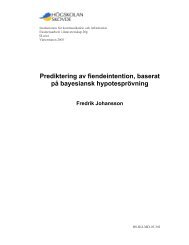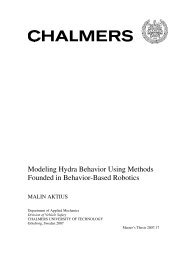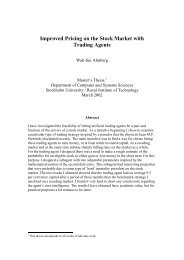Development of a Stemmer for the Greek Language - SAIS
Development of a Stemmer for the Greek Language - SAIS
Development of a Stemmer for the Greek Language - SAIS
Create successful ePaper yourself
Turn your PDF publications into a flip-book with our unique Google optimized e-Paper software.
Figure 3: “TZK algorithm” overview<br />
The “TZK algorithm”, as it is mentioned on <strong>the</strong> relevant paper, removes totally 65<br />
suffixes in both levels and as <strong>the</strong>y admitted that “<strong>the</strong>y have include only a small<br />
set <strong>of</strong> suffixes because <strong>the</strong>y have reach a stage where <strong>the</strong> addition <strong>of</strong> more rules to<br />
increase <strong>the</strong> per<strong>for</strong>mance in one area causes a degradation <strong>of</strong> <strong>the</strong> per<strong>for</strong>mance<br />
elsewhere”. This main constraint makes <strong>the</strong> algorithm limited, as in <strong>the</strong> <strong>Greek</strong><br />
language <strong>the</strong>re are at least 166 different inflectional suffixes (Triantafyllidis 1941).<br />
Fur<strong>the</strong>rmore, <strong>the</strong> algorithm works only with <strong>Greek</strong> capital letters in order to deal<br />
with <strong>the</strong> diacritical sign (tone-mark) that is placed over a lower case vowel<br />
affecting <strong>the</strong> meaning and <strong>the</strong> orthography <strong>of</strong> <strong>the</strong> word.<br />
Ano<strong>the</strong>r critical part <strong>of</strong> <strong>the</strong> algorithm is that <strong>the</strong> derivational suffix removal works<br />
according to <strong>the</strong> grammatical category <strong>of</strong> <strong>the</strong> word. And as <strong>the</strong>re is no<br />
morphological analysis tool <strong>for</strong> <strong>the</strong> given word, <strong>the</strong> suffixes table on <strong>the</strong> 1 st<br />
removal level is not enough to distinguish if a word is noun, adjective or verb.<br />
Even though, <strong>the</strong> algorithm seems to per<strong>for</strong>m an acceptable stemming <strong>for</strong> <strong>Greek</strong><br />
texts. According to <strong>the</strong> first evaluation, in 1995, <strong>the</strong> algorithm was tested on two<br />
document collections on medical and computer science, with 7959 distinct words<br />
totally. The errors <strong>of</strong> <strong>the</strong> stemmed words were around 10 per cent with<br />
satisfactory precision and recall.<br />
In 1999 <strong>the</strong> same researchers (Kalamboukis & Nikolaidis 1999) did an evaluation<br />
<strong>of</strong> stemming algorithms with Modern <strong>Greek</strong> using a different approach. Using<br />
SMART (Storage Management and Retrieval) system developed at Cornell<br />
University. They have added some new and modified existing procedures <strong>of</strong><br />
SMART in order to make <strong>the</strong>m handle <strong>Greek</strong> texts, including a “stopword” list <strong>of</strong><br />
<strong>the</strong> most frequent <strong>Greek</strong> words and <strong>the</strong>y tested 3 algorithms in total; <strong>the</strong> “TZK<br />
algorithm” (Kalamboukis & Nikolaidis 1995), <strong>the</strong> “infl_only” algorithm, which<br />
removes only 19 inflectional suffixes and a new modified version <strong>of</strong> <strong>the</strong> TZK<br />
algorithm. The evaluation <strong>of</strong> <strong>the</strong>se algorithms showed that “stemming is a<br />
clustering process depended on <strong>the</strong> corpus and <strong>the</strong>re<strong>for</strong>e to avoid conflation not<br />
7





